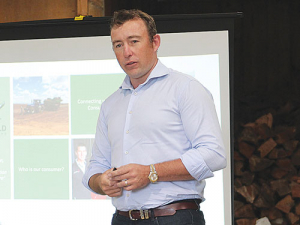“I will put my hand up and say ‘I have done it, I have thought I just want you gone’,” Kidd told a Puhoi Beef + Lamb NZ field day.
Are we finishing animals properly? Kidd asked, in a challenging address on the need to create value in our product.
Kidd, a former Young Farmer of the Year, visited six countries in the Global Focus Programme as part of his Nuffield Scholarship.
He visited 16-farm dairy operation in Brazil owned by NZ interests where they produce UHT milk on an all-grass system. In a year they can turn wasteland -- scrub, not forest -- to productive pasture running 10 cows/ha on a 24-day round.
In Japan he saw an industrial beef finishing farm with Friesian steers coming out of the dairy industry. Like many industrial systems they knew the cost of feeding each animal down to the last cent.
“The greatest story we have in NZ is being able to tell exactly what happened out there,” says Kidd, who manages a sheep and beef farm at Shelly Beach, on the Kaipara Harbour west of Auckland.
“Water and sunlight from the sky, beautiful fertile soils and the most you do is put on a bit of NPK.”
A big value-add opportunity NZ has is to improve its traceability and be able to show the history of the animal.
The impact of farming on the environment is becoming hugely important particularly to big-business consumers of our product.
“Because the McDonalds, the Nestles, don’t want to hear a [negative] story that can be linked to them from earlier in the supply chain.”
Packaging is a key factor he noted during his world travels. He showed an example of veal packaging making claims such as antibiotic free, hormone free, humanely harvested and vegetarian fed. Most of our animals meet those claims. “But to make those claims at a retail level you must have traceability and assurance all the way back to the start.”
The US company Wholefoods has adopted ‘global animal practice’ which rates how the animal has been treated in its life and the way it has been grown. It runs from systems one to five with five the highest.
Most of our systems would make the four grade as a pasture-centric model, he says. There is not a lot of four in their markets because most of their animals are grain-fed.
He met with McDonalds, which has set up a global roundtable for sustainable beef. He was told by a McDonalds representatives that Brazil, Paraguay, Canada, US and Australia have all signed the accord. It sets a level of standards that generally in NZ we would meet comfortably. But we are only now getting involved.
“Too often we are a fast follower not a leader. It is important to recognise how it is for major companies like McDonalds, Burger King -- the companies that take our product -- that we sign up to these global accords.”
So when BLNZ says ‘you need to do X and Y on the farm’ there is a genuine reason for it: the processors are hoping to gain access to some of these markets.
Shocking
Traceability is one of the lessons from the M. bovis scenario, David Kidd said.
“NAIT was introduced partly to give confidence to our overseas markets that we knew where our animals had been and where they were farmed throughout their lifetime. That was our entrance into some of these markets.
“We have had a major scare; hopefully we can get on top of it. But at least it’s not a disease that is absolutely life threatening like foot and mouth or BSC.
“[Our inability] to find where all those animals have gone and which farms they have been through is shocking.”









